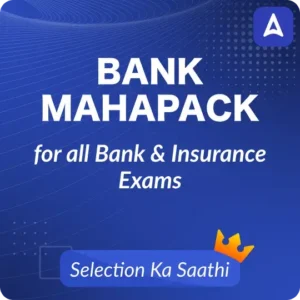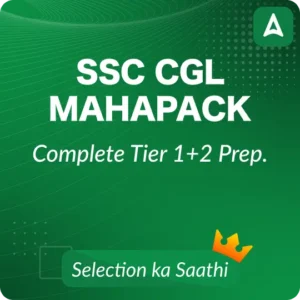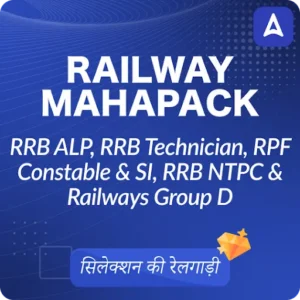Table of Contents
GSSSB CCE Syllabus 2024: Candidates interested in applying for the GSSSB CCE Recruitment 2024 and securing a government job in Gujarat must start their exam preparations now. To prepare for this exam candidates need to understand the GSSSB CCE Syllabus and Exam Pattern 2024. Having a deep understanding of the CCE syllabus will ensure your better preparation for the exam. Here in this article, we have shared all the details related to the CCE Syllabus and the latest exam pattern for prelims and mains exams.
GSSSB CCE Exam Pattern 2024
There will be two stages in the GSSSB CCE 2024 Exam. Stage I is Prelims which is a qualifying stage and Stage II is Mains Exam based on which the final merit list will be prepared. Candidates can check the GSSSB CCE Exam Pattern for both Prelims and Mains here in the article.
GSSSB Clerk 2024 Prelims Exam Pattern
The GSSSB Clerk Prelims Exam is a qualifying exam of 100 MCQ questions for 100 marks. The total exam duration is 60 minutes. Candidates can check the exam pattern for the GSSSB CCE Prelims below.
- Questions will be asked from Reasoning Ability, Quantitative Aptitude, English Language, and Gujarati sections.
- For every correct answer 1 mark will be awarded.
- For every wrong answer, 0.25 marks will be deducted.
| Sections | No. of Questions | Marks | Duration |
|---|---|---|---|
| Reasoning Ability | 40 | 40 | 1 hour (60 minutes) |
| Quantitative Aptitude | 30 | 30 | |
| English Language | 15 | 15 | |
| Gujarati | 15 | 15 | |
| Total | 100 | 100 |
GSSSB Clerk 2024 Mains Exam Pattern
Candidates who will qualify the GSSSB Clerk Prelims Exam will appear for the Mains Exam. There are two papers in the GSSSB CCE Mains Examination- Group A for 350 marks and Group B for 200 marks.
Group A Main Examination:
- The Scheme and Subjects of the Main Examination for the Posts termed as Group A in Rule 6 shall consist of the following Papers.
- Questions from Gujarati Language Skills, English Language Skills, and General Studies will be asked.
- The duration of each paper is 3 hours and the total marks are 350.
| Subject | Marks | Duration |
|---|---|---|
| Gujarati Language Skill | 100 | 3 Hours |
| English Language Skill | 100 | 3 Hours |
| General Studies | 150 | 3 Hours |
| Total | 350 | – |
Group B Main Examination
- The Scheme and Subjects of the Main Examination for the Posts termed Group B in Rule 6 shall consist of the following Paper.
- Questions will be asked about History, Cultural Heritage, Geography, Science and Technology, and Polity subjects.
- The duration of the main examination is 120 minutes and the total marks are 200.
| Part II: Syllabus for Main Examination | ||
|---|---|---|
| Topics | Marks | Time |
| English | 20 | 120 Minutes |
| Gujarati | 20 | |
| Polity/Public Administration/RTI/CPS/PCA | 30 | |
| History, Geography, Culture Heritage | 30 | |
| Economics, Environment, Science & Tech. | 30 | |
| Current Affairs & Current Affairs with Reasoning | 30 | |
| Reasoning | 40 | |
| Total | 200 | |
GSSSB CCE Syllabus 2024
The detailed GSSSB CCE Syllabus provides a complete understanding of the various subjects covered in the GSSSB Clerk Paper-III: General Studies for the Mains Examination. The topics covered in the GSSSB Clerk Syllabus are- History, Cultural Heritage, Geography, Science and Technology, Events of Importance, Indian State System and Constitution, Public Administration and Governance, Discipline In Public Service, and Indian Economy and Planning.
History of India
The study of India’s historical tapestry, from the ancient Indus Valley Civilization to the post-Independence era. Topics include dynasties, cultural aspects, and the transformative impact of figures like Mahatma Gandhi. Check the GSSSB CCE Syllabus for History of India in the table below.
| Topics | Subtopics |
|---|---|
| 1. Indus Valley Civilization | Characteristics, Places, Society, Cultural History, Art, and Religion |
| 2. Vedic Age | Jainism and Buddhism, Nanda Dynasty |
| 3. Maurya and Gupta empires | |
| 4. Vijayanagara Dynasty | Important dynasties of South India |
| 5. Dynasties of Gujarat | Administration, art, architecture, literature, science, and technologies |
| 6. Educational Institutions | Takshshila, Nalanda, and Valabhi |
| 7. Arrival of Europeans in India | Establishment and expansion of British rule (1757 to 1856) |
| 8. India’s Freedom Struggle of 1857 | Religious and social reform movements, factors responsible for nationalism, Indian National Congress |
| 9. Mahatma Gandhi | Impact of his ideas, principles, and teachings |
| 10. Sardar Patel | Role in Independence Movement and Post-Independence Integration |
| 11. Indian revolutionaries | Azad Indian Army, Subhas Chandra Bose |
| 12. Post-Independence India | Reorganization of states, Mahagujarat movement, Important events |
Cultural Heritage
Special focus on the unique cultural aspects of Gujarat, including its theatre, folk traditions, and tribal culture. Check the GSSSB Clerk Cultural Heritage Syllabus in the table below.
| Topics | Subtopics |
|---|---|
| 1. Salient features of Indian culture | Art forms, literature, sculpture, architecture |
| 2. Indian Society | – |
| 3. Indian cinema and theatre | – |
| 4. Arts and Crafts of Gujarat | – |
| 5. Gujarati theatre | – |
| 6. Folk culture and Oral Tradition of Gujarat | Its Significance, Characteristics, and Implications |
Geography
A comprehensive examination of the physical features, resources, and economic history of Gujarat and India. Covers developmental and environmental issues, globalization, and the global response to climate change are included in the Geography section.
| Topics | Subtopics |
|---|---|
| 1. Physical features and resources | Major landforms, climate, soil, rocks, rivers, reservoirs, vegetation, minerals, water resources |
| 2. Economic History | Primary, Tertiary, Tertiary and Quaternary |
| 3. Social and Demographic Geography | – |
| 4. Developmental and environmental issues | Sustainable development, globalization, Disaster Management, Climate Change, Environmental Degradation |
Science and Technology
Integration of science and technology in daily life, emphasizing India’s contributions. Encompasses ICT, e-Governance, India’s space programs, and achievements in science and technology.
| Topics | Subtopics |
|---|---|
| 1. Integrating science, technology, and innovation | India’s Contribution, challenges, obstacles, and role in nation-building |
| 2. Information and Communication Technologies (ICT) | Importance, Benefits, Challenges, E-Governance, Cybercrime, Cyber Security |
| 3. India’s space programs | Past, Present, Future; Energy Policy, Nuclear Policy, technology in defense services |
| 4. Achievements of Indians in science and technology | Matters related to intellectual property rights in the field of science and technology |
Events of Regional, National, and International Importance
An overview of key events shaping India and the world, providing a contextual understanding of historical, political, and social developments.
Indian State System and Constitution
In-depth exploration of the Constitution, federal structure, and constitutional amendments. Includes detailed insights into the functioning of Parliament, State Legislatures, and the Judiciary.
| Topics | Subtopics |
|---|---|
| 1. Constitution of India | Salient features |
| 2. Functions and duties of Union and State Governments | Issues and challenges related to the federal structure, Role of the Governor, Division of Powers |
Public Administration and Governance
Covers government policies, development processes, and issues related to good governance and e-governance.
| Topics | Subtopics |
|---|---|
| 1. Meaning, Nature, and Scope of Public Administration | Evolution in India, the role of civil service |
| 2. Government policies and interventions | Implementation issues, problems, development of various sectors |
| 3. Development Process | Role of civil society, non-governmental organizations, statutory bodies |
| 4. Development Process | Regulatory bodies, quasi-judicial bodies, Good Governance, e-governance, Transparency, accountability, Bill of Rights, Right to Information |
| 5. Rights-related issues | Human Rights, Women’s Rights, Rights of Scheduled Castes and Scheduled Tribes, Rights of Children |
| 6. International organizations | Structure, Functions |
Discipline In Public Service
Explores rights-related issues and challenges, including anti-corruption systems, human interaction, attitude, emotional intelligence, and human values in the context of public service.
| Topics | Subtopics |
|---|---|
| 1. Ethics and Human Interaction | Essence, Determinants, Implications, Consequences, Dimensions of Ethics, Ethics in Personal and Public Relations |
| 2. Attitude | Basic elements, Functions, Effect on thoughts, behaviour, and relationship |
| 3. Emotional Intelligence | Concept, Usefulness, Applications in Management and Governance |
| 4. Human Values | Role of Family, Society, and Educational Issues in Educating Citizens about Values |
| 5. Ethics-related issues and challenges | Anti-corruption system, Lokpal, Lokayukta |
| 6. Case study | Matters related to the above topics (1-5) |
Indian Economy and Planning
Detailed exploration of the Indian economy, planning practices, regulatory frameworks, public finance, rural development, and the external sector. Special focus on Gujarat’s economic overview and infrastructure development.
| Topics | Subtopics |
|---|---|
| 1. Indian Economy | Emergence, Development of Planning Practice, Economic performance, Challenges, Initiatives, Events, Developments, Social sector initiatives, Niti Aayog |
| 2. Regulatory Framework for Finance and Banking | Concepts, Structure, Role, Monetary policy, Fiscal policy |
| 3. Indian Public Finance | Tax System, Public expenditure, Public Debt, deficit, Aid in Indian Economy, Fiscal Relations |
| 4. Various indicators of the economy | Indian important institutions involved in public administration |
| 5. Rural Development and Rural Economy | Challenges, Policies; Employment policies/Schemes in India |
| 6. External Sector | Trends, Structure, Direction of Foreign Trade, FII, FDI |
| 7. The Economy of Gujarat | Overview; Economy, economic, and social infrastructure development policies of Gujarat, Co-operative movement in Gujarat |

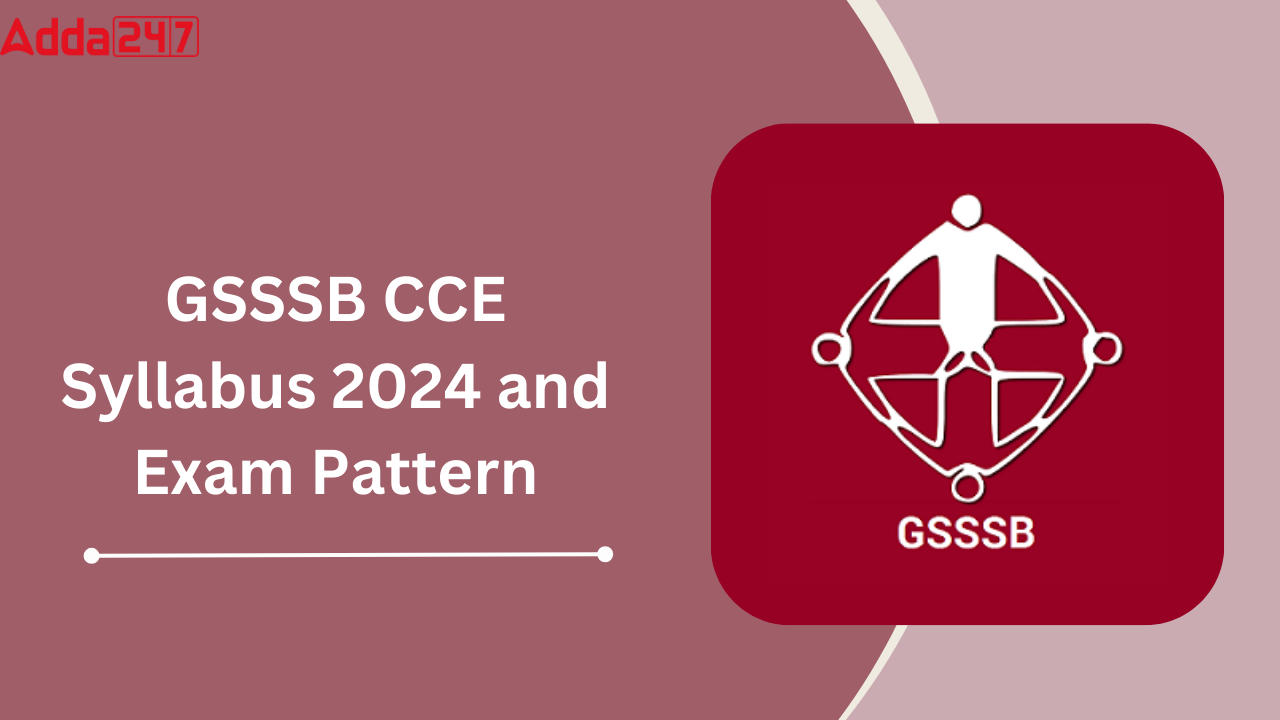

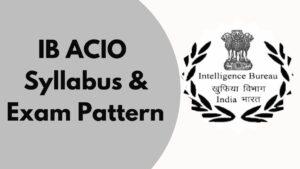 IB ACIO Syllabus 2025, Exam Pattern For ...
IB ACIO Syllabus 2025, Exam Pattern For ...
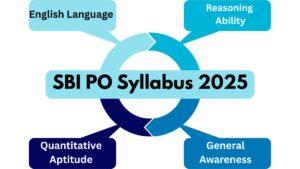 SBI PO Syllabus 2025, Latest Exam Patter...
SBI PO Syllabus 2025, Latest Exam Patter...
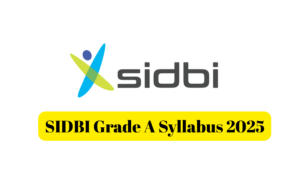 SIDBI Grade A and B Syllabus 2025 And Ex...
SIDBI Grade A and B Syllabus 2025 And Ex...
